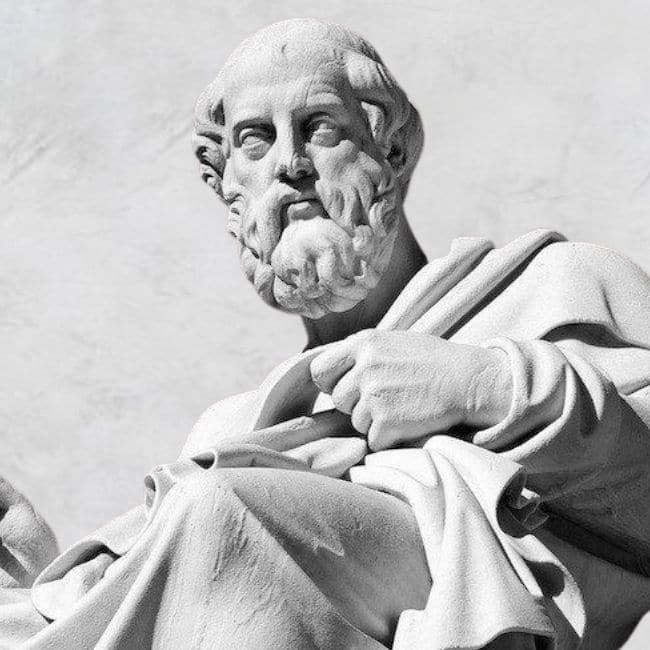Deontology
What makes something right or wrong?
One answer comes from the work of German philosopher Immanuel Kant, who is considered the founder of an ethical theory called deontology. Deontology comes from the Greek word deon, meaning duty. It holds, quite simply, that actions are good or bad based on whether they fulfil universal moral duties.
Ethics in your inbox.
Get the latest inspiration, intelligence, events & more.
By signing up you agree to our privacy policy
You might be interested in…
Opinion + Analysis
Relationships
Can we celebrate Anzac Day without glorifying war?
Opinion + Analysis
Relationships
On saying “sorry” most readily, when we least need to
WATCH
Relationships
Consequentialism
Opinion + Analysis
Relationships
Would you kill one to save five? How ethical dilemmas strengthen our moral muscle
BY The Ethics Centre
The Ethics Centre is a not-for-profit organisation developing innovative programs, services and experiences, designed to bring ethics to the centre of professional and personal life.
Consequentialism
For lots of people, what makes a decision right or wrong depends on the outcome of that decision.
Does it increase or decrease the amount of happiness in the world? This kind of thinking is typical of consequentialism: an ethical school of thought that says what makes an action good or bad is, you guessed it, the consequences.
Ethics in your inbox.
Get the latest inspiration, intelligence, events & more.
By signing up you agree to our privacy policy
You might be interested in…
Explainer
Relationships
Ethics explainer: Cultural Pluralism
Opinion + Analysis
Relationships
Is it ethical to splash lots of cash on gifts?
Opinion + Analysis
Politics + Human Rights, Relationships, Society + Culture
Stop giving air to bullies for clicks
Opinion + Analysis
Politics + Human Rights, Relationships
To deal with this crisis, we need to talk about ethics, not economics
BY The Ethics Centre
The Ethics Centre is a not-for-profit organisation developing innovative programs, services and experiences, designed to bring ethics to the centre of professional and personal life.
Purpose, values, principles: An ethics framework
An ethics framework is a statement of an organisation’s purpose, values and principles.
It makes clear what they believe in and what standards they’ll uphold. It’s a roadmap to good decision making and, if it’s lived throughout the organisation. It’s also a guide to making an organisation the best version of itself.
Trying to make a decision without knowing your purpose, values and principles, is like being at sea without a rudder. They’ll be pushed around by the winds of our desires, mood, unconscious mind, group dynamics and social norms. The choices they make won’t really be their own.
Ethics in your inbox.
Get the latest inspiration, intelligence, events & more.
By signing up you agree to our privacy policy
You might be interested in…
Opinion + Analysis
Relationships, Society + Culture
Joker broke the key rule of comic book movies: it made the audience think
Opinion + Analysis
Relationships
Power and the social network
Opinion + Analysis
Health + Wellbeing, Relationships
The Ethics of Online Dating
Opinion + Analysis
Climate + Environment, Relationships
“Animal rights should trump human interests” – what’s the debate?
BY The Ethics Centre
The Ethics Centre is a not-for-profit organisation developing innovative programs, services and experiences, designed to bring ethics to the centre of professional and personal life.
What is ethics?
Ethics asks how we should live, what choices we should make and what makes our lives worth living.
It helps us define the conditions of a good choice and then figure out which of all the options available to us is the best one. Ethics is the process of questioning, discovering and defending our values, principles and purpose. It’s about finding out who we are and staying true to that in the face of temptations, challenges and uncertainty. It’s not always fun and it’s hardly ever easy, but if we commit to it, we set ourselves up to make decisions we can stand by, building a life that’s truly our own and a future we want to be a part of.
Ethics in your inbox.
Get the latest inspiration, intelligence, events & more.
By signing up you agree to our privacy policy
You might be interested in…
Opinion + Analysis
Relationships
We can help older Australians by asking them for help
Opinion + Analysis
Relationships
Struggling with an ethical decision? Here are a few tips
Explainer
Relationships
Ethics Explainer: Begging the question
Opinion + Analysis
Relationships
Violent porn denies women’s human rights
BY The Ethics Centre
The Ethics Centre is a not-for-profit organisation developing innovative programs, services and experiences, designed to bring ethics to the centre of professional and personal life.
Israel or Palestine: Do you have to pick a side?

Israel or Palestine: Do you have to pick a side?
Opinion + AnalysisPolitics + Human Rights
BY The Ethics Centre 27 OCT 2023
We are inclined to pick a side in complex conflicts, but doing so can diminish our ethical point of view.
In the early hours of 7 October 2023, Hamas launched a barrage of rockets from Gaza into Israel while armed terrorists crossed the border and began a rampage of death and destruction targeting civilians, including children. In the days that followed, Israeli forces retaliated by blockading Gaza, cutting off food, electricity and water supplies, and began bombarding the densely populated city, killing thousands of Palestinian civilians, including children.
When our news screens are filled with footage of such horrors, our moral minds cry out for justice. But justice for whom?
One of the quirks of our moral minds is that we tend to see the world in terms of black and white or good and evil. If we hear about a heinous or unjust act, our sympathies go out to the victims while outrage inspires us to want the perpetrators to be punished. This sorts the world into two categories: the wronged, who deserve sympathy and protection, and the wrongdoers, who are morally diminished or even dehumanised.
Another quirk of our moral minds is that we struggle with ambivalence, which is the ability to see something as being both good and bad at the same time. Once someone – or a group – are painted as the wronged, it’s difficult to also perceive them simultaneously as being wrongdoers in some other capacity. Attempting to do so creates an uncomfortable state of dissonance, and the easiest way to resolve it is to dismiss the troubling thought and collapse things back into black and white.
On top of this we have our personal connections and affiliations, or a sense of shared identity that can cause us to feel solidarity with one side rather than the other. This in-group solidarity is then reinforced through shared expressions of grief and outrage. It is also policed, with any signs of sympathy for the “other side” drawing stiff rebuke.
This is all natural. It’s how our moral minds are wired. So, it’s no surprise that in the case of the Israel-Palestine conflict, many people have already picked a side. But just because it’s a natural inclination doesn’t mean it’s always a healthy one.
Picking a side can shrink our view, making us see the world through that side’s ethical lens and dismissing other possibly valid perspectives.
This is particularly apparent when we’re faced with gaps in the information we receive – as we often are during times of conflict. We tend to fill ambiguity with our own biases, and we seek out information to reinforce our view while discounting evidence to the contrary.
Picking sides can also prevent us from seeing the bigger ethical picture. And in the case of the conflict between Israel and Palestine, the bigger picture is a long history laced with ethical complexities.
However, there is another way. It requires us to acknowledge, but not necessarily follow, our moral intuitions, and instead step back to take a more universal ethical point of view. This is not the same as a neutrality that is indifferent to the claims of either side or to questions of right and wrong. It is taking the side of principle, which is a basis by which we can judge all parties.
Justice for all
Most ethical frameworks offered by philosophers are universalist, in the sense that they apply equally to all morally worthwhile individuals in similar situations. So, if you believe that it’s wrong to kill a particular individual because they’re an innocent civilian, then you should also believe that it’s wrong to kill any individual who is an innocent civilian.
You might justify that in consequentialist terms, such as by arguing that killing innocent civilians causes undue and irrevocable harm, and that the world is a better place when civilians are protected from such harm. You could equally justify it using a rights-based ethics, such as by arguing that all people have a fundamental right to life and safety.
While philosophers have a variety of views on which specific ethical framework or universal principles we ought to adopt, there are some principles that are widely accepted, with many being coded into the Universal Declaration of Human Rights. These include things like a right to life, liberty and security of person, a right to freedom of movement within the borders of one’s state, and that people shall not be arbitrarily deprived of property, as well as a right to the free expression of one’s religion.
The virtue of taking such a principled approach is that is gives us a bedrock upon which we can base our judgements of any action, agent or government. It promotes a sympathetic stance towards all suffering, and aims us towards justice for all, without shying away from condemning that which is harmful or unjust.
It might challenge our partisan feelings that favour the interests of one side over the other, but it urges us to condemn wrongdoing on any side, such attacks targeting civilians or waging war without ethical constraint.
A principled perspective also enables us to navigate complex ethical issues, such as saying that the Israeli occupation of Palestinian land might be unjust, but that it shouldn’t justify Hamas attacking civilians. Or that Hamas’s attacking civilians is clearly morally repugnant, but that shouldn’t justify the collective punishment of Gazans by Israel. And it can allow us to assert that Israel might have a right to defend its territory and citizens from attack, but it – indeed, all parties – must adhere to just war principles, such as proportionality and distinguishing between enemy combatants and civilians. And it ought to reinforce our commitment to seeing a lasting peace in the region, which will inevitably require some compromises on both sides.
Of course, even if everyone agreed on the same set of principles, there will still be substantial differences in interpretation or points of view. A principled stance must also acknowledge that there are fundamental incompatibilities between the interests and demands of both sides that no single ethical framework will be able to resolve without some kind of compromise. For example, when both sides claim certain sites as sacred, and demand exclusivity, there is no way to resolve that without compromise that will be deemed unacceptable to at least one side. However, such uncertainties and complexities don’t undermine the fact that the same universal principles ought to apply to all people involved.
Choosing to side with ethical principle rather than one side or the other is not without its challenges. It forces us to push back on some of our deep moral intuitions and sit with ambivalence and ambiguity. We might be admonished by both sides in the conflict for not backing all their claims, or called a traitor for criticising them. However, the strength is that we can respond to each of these challenges by resorting to the universal principles, compassion and desire for justice that underpins our views on both sides of the conflict.
While the internet and media landscape seem to urge us to take sides in any conflict, it is entirely possible – and often wise – to step back and apply a broader set of principles rather than fall in with a particular partisan perspective. Adopting such a principled stance doesn’t require that you have all the solutions to the conflict, it is sufficient that you have good reason to wish for a just and peaceful solution for all involved.
Image: AAP Photo / Erik S. Lesser
BY The Ethics Centre
The Ethics Centre is a not-for-profit organisation developing innovative programs, services and experiences, designed to bring ethics to the centre of professional and personal life.
Ethics in your inbox.
Get the latest inspiration, intelligence, events & more.
By signing up you agree to our privacy policy
You might be interested in…
Opinion + Analysis
Health + Wellbeing, Politics + Human Rights
Constructing an ethical healthcare system
Explainer
Politics + Human Rights, Relationships
Ethics Explainer: Gender
Big thinker
Politics + Human Rights
Big Thinker: Hannah Arendt
Opinion + Analysis
Politics + Human Rights
COP26: The choice of our lives
Big Thinker: Karl Marx

Karl Marx (1818-1883) was a philosopher, economist, and revolutionary thinker whose criticisms of capitalism and breakdowns of class struggle continue to influence contemporary thought about economic inequality and the worth of individual labour.
He was not only a prominent figure in the world of philosophy but also a key player in economic and political theory. Marx’s life and work were deeply intertwined with the tumultuous historical backdrop of the 19th century, marked by the Industrial Revolution and the rise of capitalism.
Born in Trier, Prussia (now in Germany), Marx began with a focus on law and philosophy at the University of Bonn and later at the University of Berlin. During his time in Berlin, he encountered the ideas of G.W.F. Hegel, whose methods significantly influenced Marx’s own philosophical approach.
In collaboration with Friedrich Engels, Marx developed and refined his ideas, culminating in some of the most influential works in the history of political philosophy. For example, his infamous The Communist Manifesto (1848) and Das Kapital (1867, 1885, 1894).
Historical materialism and class struggle
One of Marx’s central ideas was historical materialism, a theory that analyses the evolution of societies through the lens of economic systems. According to Marx, the structure of a society is primarily determined by its mode of production: the ways commodities and services are produced and distributed, and the social relations that affect these functions. In capitalist societies, the means of production are privately owned, leading to a class-based social structure separating the owners and the workers.
Marx’s analysis of class struggle underscores the ethical imperative of addressing economic inequality. He argued that under capitalism, the bourgeoisie (owners of the means of production) exploit the proletariat (the working class) for their own profit. This exploitation, he claims, is the engine that drives the capitalist system, where workers are paid less than the value of their labour while the bourgeoisie reap the profits. This exploitation also results in alienation, where workers are estranged from the full effects of their labour and, Marx argues, even from their own humanity.
Marx’s arguments call for a reevaluation of the inherent fairness of such a system. He questions the morality of a society where wealth and power are concentrated in the hands of a few while the masses toil in poverty. This is an ethical challenge that continues to resonate in contemporary discussions about income inequality and social justice.
Marx’s critique challenges us to consider whether a society that values profit and efficiency over the well-being and fulfillment of its members is ethically justifiable.
To address this concern, Marx envisioned a classless society, where the means of production would be collectively owned. This transition, he believed, would eliminate the inherent exploitation of capitalism and lead to a more just and equitable society. While the practical realisation of this vision has proven challenging, it remains a foundational ethical ideal for some, emphasising the need to confront economic disparities for the sake of human dignity and fairness.
Critique of capitalism and commodification
Marx’s critique of capitalism extended beyond its class divisions. He also examined the profound impact of capitalism on human relationships and the commodification of virtually everything, including labour, under this system. For Marx, capitalism reduced individuals to mere commodities, bought and sold in the labour market.
Marx’s critique of commodification highlights the importance of valuing individuals beyond their economic contributions. He argued that in a capitalist society, individuals are often reduced to their economic worth, which can erode their sense of self-worth and dignity. Addressing this ethical concern calls for recognising the intrinsic value of every person and fostering functions in societies that prioritise human well-being over profit.
The communist vision
Marx’s ultimate vision was communism, a classless society where resources would be shared collectively. In such a society, the state as we know it would wither away, and individuals would contribute to the common good according to their abilities and receive according to their needs.
This communist vision raises questions about the ethics of property and ownership. It challenges us to rethink the distribution of resources in society and consider alternative models that prioritise equity and communal well-being. While achieving a truly communist society might be complex or even out of reach, the aspiration of creating a world where everyone’s needs are met and individuals contribute to the best of their abilities is still a general ethical ideal many people intuitively strive for.
Despite this, Marx’s ideas have faced much criticism. Many believe that a classless society with a centralised power risks authoritarianism, Marx’s economic planning lacked detail, communism goes against human nature of self-interest and competition, and historical and contemporary communist systems face large practical challenges.
In spite of, and sometimes because of, these challenges, Marx’s ideas continue to spark ethical discussions about economic inequality, commodification, and the nature of human relationships in contemporary society. His legacy serves as a reminder of the enduring importance of grappling with questions of justice, equality, and human dignity in our ever-evolving social and economic landscapes.
Ethics in your inbox.
Get the latest inspiration, intelligence, events & more.
By signing up you agree to our privacy policy
You might be interested in…
Opinion + Analysis
Business + Leadership, Politics + Human Rights, Science + Technology
Not too late: regaining control of your data
Opinion + Analysis
Business + Leadership
Why businesses need to have difficult conversations
Opinion + Analysis
Business + Leadership
Sell out, burn out. Decisions that won’t let you sleep at night
Opinion + Analysis
Business + Leadership, Politics + Human Rights
Who’s afraid of the strongman?
BY The Ethics Centre
The Ethics Centre is a not-for-profit organisation developing innovative programs, services and experiences, designed to bring ethics to the centre of professional and personal life.
Would you kill one to save five? How ethical dilemmas strengthen our moral muscle

Would you kill one to save five? How ethical dilemmas strengthen our moral muscle
Opinion + AnalysisRelationships
BY The Ethics Centre 6 OCT 2023
Ethical dilemmas are, by their nature, uncomfortable or difficult to tackle, but they can also teach us a lot about our own values and principles and prepare us for an ethically complex world.
You’re about to take a major exam that will determine whether you get accepted into a potentially life-changing course. But you hear that there’s a leaked copy of the exam paper doing the rounds, and other students are studying it carefully. There are only a precious few spots available in your desired course, and if you don’t also sneak a peek at the leaked exam paper, you are likely to miss out. Should you cheat by looking at the leaked exam paper, given you know other students are doing the same?
How about if you found out that the company you work for was partnering with an overseas contractor known for running sweatshops and flouting labour laws, meanwhile your company’s branding is all about how ethical and sustainable it is. Would you speak out to management, or on social media, even if doing so might cost you your job and income?
If these scenarios give you pause, you’re not alone. Each represents a different kind of ethical dilemma we might come across, and by their nature they can be highly unsettling and difficult – if not impossible – to resolve in a way that satisfies everyone involved.
But what makes something an ethical dilemma? It’s important to note that an ethical dilemma is not a simple question of doing the ‘right’ thing or the ‘wrong’ thing, like whether you should lie to cover up for something bad that you did.
A genuine ethical dilemma arises when there is a clash between two values (i.e., what you think is good) or principles (i.e., the rules you follow). Or it can be a choice between two bad outcomes, like knowing that whatever you do, someone will get hurt.
That’s what makes them so uncomfortable; we feel like whatever choice we make will involve some kind of compromise.
All in the mind
One way to prepare yourself to face real-world ethical dilemmas is to strengthen your moral muscle by practicing on hypothetical scenarios – a staple of philosophy classes.
Consider this: you’re the captain of a sinking ship, and the lifeboat only has room for five passengers. Yet there are seven people aboard the ship, including yourself. Whom do you choose to board the lifeboat? The pregnant woman? The ageing brain surgeon? The fit young fisherman? The teenage twins? The reformed criminal who is now a priest? Yourself?
Or how about this: you’ve just started your shift as the only surgeon in a small but high-tech hospital. As you walk into your ward, you’re presented with five dying patients. You know nothing else about their personal details except that each is suffering from a different organ failure. Without assistance, all will die within 24 hours. However, at that moment, a healthy patient is wheeled in for an unrelated minor procedure. You also know nothing about their personal circumstances, but you do know they have five perfectly healthy organs. Were you to allow that patient to die (as they will without treatment) you know you could save the lives of the other five dying patients. Would you allow one to die to save five?
Each of these scenarios is carefully constructed to put pressure on your ethical intuitions and force you to make difficult decisions.
Tackling a hypothetical dilemma gives you an opportunity to reflect on your own values and principles, and search for good reasons to justify your choices.
Even if the hypothetical situation is absurdly unreal, you can still learn a lot about yourself and your ethical stance by considering how you would act in these cases.
Your first impulse might be to try and change the circumstances to eliminate or minimise the dilemma. We might speculate that we could squeeze another person on the lifeboat, or that the organ transplants may not succeed, and that might make our decisions easier. This is entirely natural – and sensible – especially because dilemmas in the real world are rarely as clear cut. But dodging the dilemma misses the point of the exercise.
You might decide that a consequentialist approach is the best one for the lifeboat scenario, causing you to pick the people who might end up leading the richest lives or having the most positive impact on others. But you might decide that a deontological approach is most appropriate for the surgeon’s dilemma, arguing that it’s inherently wrong to withhold treatment from an ‘innocent’ patient, even if it ends up saving lives.
It’s important to remember that hypothetical dilemmas like this are designed so that there’s likely no simple answer that will satisfy everybody. Even reasonable people can disagree about what course of action to take. That’s fine. The important bit is not really the answer you come to but the reasons you give to support it. That’s what ethics is all about: finding good reasons to act the way we do.
Most of us are likely to go through life without ever having to put people in lifeboats or contemplate the death of one to save five, but by testing ourselves with these dilemmas we can build our ethical muscles and be more ready to face other dilemmas that world could throw at us at any time.
If you’re struggling with a real-life ethical dilemma, it can be tough finding the best path forward. Ethi-call is a free independent helpline offering decision-making support from trained ethics counsellors. Book a call today.
Ethics in your inbox.
Get the latest inspiration, intelligence, events & more.
By signing up you agree to our privacy policy
You might be interested in…
Opinion + Analysis
Health + Wellbeing, Relationships
Send in the clowns: The ethics of comedy
WATCH
Relationships
How to have moral courage and moral imagination
Opinion + Analysis
Relationships
Putting the ‘identity’ into identity politics
Big thinker
Relationships
Big Thinker: Plato
BY The Ethics Centre
The Ethics Centre is a not-for-profit organisation developing innovative programs, services and experiences, designed to bring ethics to the centre of professional and personal life.
You’re the Voice: It’s our responsibility to vote wisely

You’re the Voice: It’s our responsibility to vote wisely
Opinion + AnalysisPolitics + Human Rights
BY The Ethics Centre 13 SEP 2023
The Voice referendum is a high stakes decision that could affect many thousands of lives, and that means we have an ethical responsibility to choose how we vote carefully.
Not all decisions are created equal. Some are trivial in their consequences, like whether you choose the chocolate or strawberry ice cream for dessert. Some have higher stakes, like whether you decide to prioritise your career over travelling the world. Yet, these decisions still only affect how you live and are unlikely to impact anyone else.
You can make these decisions in a considered or a flippant way. Or you can choose to not make them at all (although doing so is still making a choice, of sorts). With low stakes personal decisions, you don’t even need to have a good reason for choosing what you do. The only person to whom you owe a justification is yourself – and you can always choose to free yourself of that burden.
But there are other kinds of decisions, ones that impact not just us but other people too. Decisions like these demand more from us and we cannot be so flippant with them. In these cases, we have a greater ethical responsibility to come to a more considered position, to weigh up the options more carefully, and be ready to justify our decision with good reasons.
This is the type of decision are we making when it comes to the Voice to Parliament referendum.
The stakes
In the case of the Aboriginal and Torres Strait Islander Voice, the stakes are whether Indigenous peoples are afforded constitutional protection for a consultatory body that will advise government on legislation affecting their communities – a body that cannot be legislated away with a change of government.
Leading Indigenous figures representing peoples from across Australia and the Torres Strait have asked the Australian people to make the constitutional change because they believe such a consultatory body will have a significant impact on the wellbeing of their peoples and will help correct over two centuries of political disempowerment and discrimination.
Be a good citizen
So, you have a decision to make, one that will likely have a significant impact on a vulnerable population. That places an ethical responsibility on each registered voter to take the decision seriously. This means not treating it flippantly and having a principled reason for voting, regardless of which way you vote. This is what it means to be a “good citizen”.
It’s easy to think of citizenship as simply affording us rights, such a right to have a say in how we’re governed or a right to be treated fairly under the law. However, citizenship also bestows upon us responsibilities, like voting in elections and serving on a jury if called.
But these are just the minimal responsibilities involved in citizenship. We need to do more to be a “good citizen”, including keeping ourselves engaged in issues of public significance and maintaining a basic level of political literacy. A good citizen also doesn’t just grumble about the state of society, they act to make it better. Finally, a good citizen sees themselves as members of an interconnected society, and is willing to make sacrifices or compromise for the common good. So, a good citizen will see the Voice referendum as an opportunity to exercise their responsibilities and engage with the issue actively to make an informed decision.
Be informed
The good news is that there is an abundance of information readily available for each of us to come to a principled decision. However, there is also a wealth of misinformation and disinformation floating around as well. Some of this is shared due to genuine confusion and some is spread by bad faith actors who have their own motivations for attempting to sway votes.
Explore what you really think
This is why it’s important to look at who is speaking and understand their motivations, which might not always be reflected in their arguments. Many people are motivated to vote one way or the other simply because that’s how their perceived political allies are voting, or they might be swayed by unconscious biases and use plausible sounding arguments as post-hoc rationalisations for how they feel deep down.
You can tell that someone is pushing post-hoc rationalisations when you successfully challenge their argument, such as by showing they have been duped by misinformation, but they still don’t change their mind. In this case, simply throwing more facts at them is unlikely to sway them.
A more successful approach is to be sceptical that the first reasons they give are the true motivations for their views. Instead, ask more questions about why they believe what they do and what they’re concerned will happen if the vote doesn’t go their way. Ask questions about how they can be confident their facts are true or what it would take to change their mind.
Rather than positioning yourself as an opponent, try taking the stance as a fellow traveller trying to get to the bottom of the matter. If you’re able to show respect, build trust and lower defensiveness, you’ll have a better chance of opening their mind to alternative perspectives – although it’s also crucial to remain open to alternate perspectives yourself.
There is no right answer
This is because there is no one “right answer” to the referendum question. Reasonable people can disagree on whether a Voice to Parliament is the best mechanism to promote the welfare and representation of Indigenous peoples, or whether a Voice ought to be enshrined in the constitution. When discussing the issue with others, it’s easy to assume that people who disagree with us must harbour some problematic views or that they are simply misguided. Resist that urge and ask questions that aim to tease out good reasons for or against the Voice.
The stakes involved in the Voice referendum mean that we should all take our responsibility to vote in a considered way seriously, and we should be mindful of how we make our decision. Even though there are many pressing issues facing the Australian public, from the cost of living through to climate change, that doesn’t mean we can’t also engage with the longstanding issue of Indigenous disadvantage, especially because there’s often not much we can do about many big issues but we’ve been explicitly invited to have a say on the Voice.
For everything you need to know about the Voice to Parliament visit here.
Ethics in your inbox.
Get the latest inspiration, intelligence, events & more.
By signing up you agree to our privacy policy
You might be interested in…
Big thinker
Politics + Human Rights, Relationships
Big Thinker: Eleanor Roosevelt
Opinion + Analysis
Politics + Human Rights, Relationships, Society + Culture
In the face of such generosity, how can racism still exist?
Opinion + Analysis
Politics + Human Rights
If you don’t like politicians appealing to voters’ more base emotions, there is something you can do about it
Explainer
Society + Culture, Politics + Human Rights
Ethics Explainer: Moral Courage
BY The Ethics Centre
The Ethics Centre is a not-for-profit organisation developing innovative programs, services and experiences, designed to bring ethics to the centre of professional and personal life.
Ethics explainer: Cultural Pluralism

Imagine a large, cosmopolitan city, where people from uncountable backgrounds and with numerous beliefs all thrive together. People embrace different cultural traditions, speak varying languages, enjoy countless cuisines, and educate their children on diverse histories and practices.
This is the kind of pluralism that most people are familiar with, but a diverse and culturally integrated area like this is specifically an example of cultural pluralism.
Pluralism in a general sense says there can be multiple perspectives or truths that exist simultaneously, even if some of those perspectives are contradictory. It’s contrasted with monism, which says only one kind of thing exists; dualism, which says there are only two kinds of things (for example, mind and body); and nihilism, which says that no things exist.
So, while pluralism more broadly refers to a diversity of views, perspectives or truths, cultural pluralism refers specifically to a diversity of cultures that co-exist – ideally harmoniously and constructively – while maintaining their unique cultural identities.
Sometimes an entire country can be considered culturally pluralistic, and in other places there may be culturally pluralistic hubs (like states or suburbs where there is a thriving multicultural community within a larger more broadly homogenous area).
On the other end of the spectrum is cultural monism, the idea that a certain area or population should have only one culture. Culturally monistic places (for example, Japan or North Korea) rely on an implicit or explicit pressure for others to assimilate. Whereas assimilation involves the homogenisation of culture, pluralism encourages diversity, often embracing people of different ethnic groups, backgrounds, religions, practices and beliefs to come together and share in their differences.
A pluralistic society is more welcoming and supportive of minority cultures because people don’t feel pressured to hide or change their identities. Instead, diverse experiences are recognised as opportunities for learning and celebration. This invites travel and immigration, and translates into better mental health for migrants, the promotion of harmony and acceptance of others, and enhances creativity by exposing people to perspectives and experiences outside of their usual remit.
We also know what the alternative is in many cases. Australia has a dark history of assimilation practices, a symptom of racist, colonial perspectives that saw the decimation of First Nations people and their cultures. Cultural pluralism is one response to this sort of cultural domination that has been damaging throughout history and remains so in many places today.
However, there are plenty of ethical complications that arise in the pursuit of cultural plurality.
For example, sociologist Robert D. Putnam published research in 2007 that spoke about negative short-medium term effects of ethnically diverse neighbourhoods. He found that, on average, trust, altruism and community cooperation was lower in these neighbourhoods, even between those of the same or similar ethnicities.
While Putnam denied that his findings were anti-multicultural, and argues that there are several positive long-term effects of diverse societies, the research does indicate some of the risks associated with cultural pluralism. It can take a large amount of effort and social infrastructure to build and maintain diverse communities, and if this fails or is done poorly it can cause fragmentation of cultural communities.
This also accords with an argument made by journalist David Goodhart, that says people are generally divided into “Anywheres” (people with a mobile identity) and “Somewheres” (people, usually outside of urban areas, who have marginalised, long-term, location-based identities). This incongruity, he says, accounts for things like Brexit and the election of Donald Trump, because they speak to the Somewheres who are threatened by changes to their status quo. Pluralism, Goodhart notes, risks overlooking the discomfort these communities face if they are not properly supported and informed.
Other issues with pluralism include the prioritisation of competing cultural values and traditions. What if one person’s culture is fundamentally intolerant of another person’s culture? This is something we see especially with cultures organised around or heavily influenced by religion. For example, Christianity and Islam are often at odds with many different cultures around issues of sexual preference and gendered rights and responsibilities.
If we are to imagine a truly culturally pluralistic society, how do we ethically integrate people who are intolerant of others?
Pluralism as a cultural ideal also has direct implications for things like politics and law, raising the age-old question about the relationship between morality and the law. If we want a pluralistic society generally, how do the variations in beliefs, values and principles translate into law? Is it better to have a centralised legal system or do we want a legal plurality that reflects the diversity of the area?
This does already exist in some capacity – many countries have Islamic courts that enforce Sharia law for their communities in addition to the overarching governmental law. This parallel law-enforcement also exists in some colonised countries, where parts of Indigenous law have been recognised. For example, in Australia, with the Mabo decision.
Another feature of genuine cultural pluralism that has huge ethical implications and considerations is diversity of media. This is the idea that there should be (that is, a media system that is not monopolised) and diverse representation in media (that is, media that presents varying perspectives and analyses).
Firstly, this ensures that media, especially news media, stays accountable through comparison and competition, rather than a select powerful few being able to widely disseminate their opinions unchecked. Secondly, it fosters a greater sense of understanding and acceptance by exposing people to perspectives, experiences and opinions that they might otherwise be ignorant or reflexively wary of. Thirdly, as a result, it reduces the risk that media, as a powerful disseminator of culture, could end up creating or reinforcing a monoculture.
While cultural pluralism is often seen as an obviously good thing in western liberal societies, it isn’t without substantial challenges. In the pursuit of tolerance, acceptance and harmony, we must be wary of fragmenting cultures and ensure that diverse communities have adequate social supports to thrive.
Ethics in your inbox.
Get the latest inspiration, intelligence, events & more.
By signing up you agree to our privacy policy
You might be interested in…
Opinion + Analysis
Politics + Human Rights, Relationships
Assisted dying: 5 things to think about
Opinion + Analysis
Relationships
What we owe to our pets
Explainer
Politics + Human Rights, Relationships
Ethics Explainer: Gender
Opinion + Analysis
Relationships
We live in an opinion economy, and it’s exhausting
BY The Ethics Centre
The Ethics Centre is a not-for-profit organisation developing innovative programs, services and experiences, designed to bring ethics to the centre of professional and personal life.
Big Thinker: Judith Jarvis Thomson

Big Thinker: Judith Jarvis Thomson
Big thinkerPolitics + Human Rights
BY The Ethics Centre 11 JUL 2023
Judith Jarvis Thomson (1929-2020) is one of the most influential ethicists and metaphysicians of the 20th century. She’s known for changing the conversation around abortion, as well as modernising what we now know as the trolley problem.
Thomson was born in New York City on October 4th, 1929. Her mother was Catholic of Czech heritage and her father was Jewish, who both met at a socialist summer camp. While her parents were religious, they didn’t impose their beliefs on her.
At the age of 14, Thomson converted to Judaism, after her mother died and her father remarried a Jewish woman two years later. As an adult, she wasn’t particularly religious but she did describe herself publicly as “feel[ing] concern for Israel and for the future of the Jewish people.”
In 1950, Thomson graduated from Barnard College with a Bachelor of Arts (BA), majoring in philosophy, and then received a second BA in philosophy from Cambridge University in England in 1952. She then went on to receive her Masters in philosophy from Cambridge in 1956 and her PhD in philosophy from Columbia University in New York in 1959.
Violinists, trolleys and philosophical work
Even though she had received her PhD from Columbia, the philosophy department wouldn’t keep her as a professor as they didn’t hire women. In 1962, she began working as an assistant professor at Barnard college, though she later moved to Boston University and then MIT with her husband, James Thomson, for the majority of her career.
Thomson is most famous for her thought experiments, especially the violinist case and the trolley problem. In 1971, Thomson published her book A Defense of Abortion, which presented a new kind of argument for why abortions are permissible during a time of heightened debate in the US as a result of the second wave feminist movement. Arguments that defended a woman’s right to an abortion circulated feminist publications and eventually led to the Supreme Court ruling in favour of Roe v. Wade (1973).
“Opponents of abortion commonly spend most of their time establishing that the foetus is a person, and hardly any time explaining the step from there to the impermissibility of abortion.” – Judith Jarvis Thomson
The famous violinist case asks us to imagine if it is permissible to “unplug” ourselves from a famous violinist, even if it is only for nine months and being plugged in is the only thing keeping them alive. As Thomas Nagel said, “she expresses very clearly the essentially negative character of the right to life, which is that it’s a right not to be killed unjustly, and not a right to be provided with everything necessary for life.” To this day, the violinist case is taught in classrooms and recognised as one of the most influential thought experiments arguing for the permissibility of abortion.
Thomson is famous for another famous thought experiment, the trolley problem. In her 1976 paper “Killing, Letting Die and the Trolley Problem,” Judith Jarvis Thomson articulates a famous thought experiment, first imagined by Philippa Foot, that encourages us to think about the moral relevance of killing people, as opposed to letting people die by doing nothing to save them.
In the trolley problem thought experiment, a runaway trolley will kill five innocent people unless someone pulls a lever. If the lever is pulled, the trolley will divert onto a different track and only one person will die. As an extension to Foot’s argument, Thomson asks us to think if there is something different about pushing a large man off a bridge, thereby killing him, to prevent five people from dying from the runaway trolley. Why does it feel different to pull a lever rather than push a person? Both have the same potential outcomes and distinguish between killing a person and letting a person die.
In the end, what Thomson finds is that oftentimes, the action as well as the outcome are morally relevant in our decision making process.
Legacy
Thomson’s extensive philosophical career hasn’t gone unnoticed. In 2012, she was awarded the American Philosophical Association’s prestigious Quinn Prize for her “service to philosophy and philosophers.” In 2015, she was awarded an honorary doctorate by the University of Cambridge, and then in 2016 she was awarded another honorary doctorate from Harvard.
Thomson continues to inspire women in philosophy. As one of her colleagues, Sally Haslanger, says: “she entered the field when only a tiny number of women even considered pursuing a career in philosophy and proved beyond doubt that a woman could meet the highest standards of philosophical excellence … She is the atomic ice-breaker for women in philosophy.”
Ethics in your inbox.
Get the latest inspiration, intelligence, events & more.
By signing up you agree to our privacy policy
You might be interested in…
Explainer
Business + Leadership, Politics + Human Rights
Ethics Explainer: Universal Basic Income
Big thinker
Politics + Human Rights
Big Thinker: Kimberlé Crenshaw
Big thinker
Politics + Human Rights, Relationships
Big Thinker: Adam Smith
Opinion + Analysis
Politics + Human Rights, Relationships














































